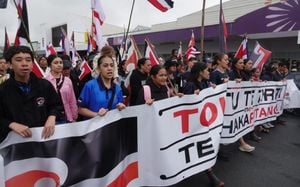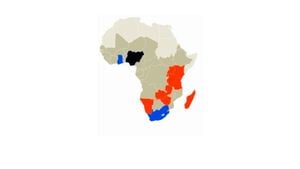For the third consecutive year, the global battle against climate change shows little sign of improvement, with predictions about rising temperatures remaining unchanged as world leaders convene for the latest round of United Nations climate talks. Just recently held in the capital of Azerbaijan, Baku, these discussions aim to tackle the urgent issue of heat-trapping emissions and establish new targets. Yet, the grim reality remains: climate experts report the world is poised to warm by 2.7 degrees Celsius (or 4.9 degrees Fahrenheit) compared to pre-industrial times.
This worrying projection emerges from the Climate Action Tracker, which carefully evaluates global government policies and their impact on climate warming. Bill Hare, the CEO of Climate Analytics, voiced concerns about the current state of negotiations, indicating, "If emissions are still rising and temperature projections are no longer dropping, people should wonder if the United Nations climate negotiations — known as COP — are doing any good." He acknowledged, "There’s an awful lot going on that's positive here, but on the big picture of actually getting stuff done to reduce emissions ... to me it feels broken."
The world has already seen its temperature rise by 1.3 degrees Celsius (or about 2.3 degrees Fahrenheit) since pre-industrial times, inching closer to the 1.5-degree threshold established during the 2015 climate talks held in Paris. Climate scientists warn this warming, primarily rooted in human activities, mainly the burning of fossil fuels, leads to increasingly severe weather patterns, such as extreme droughts, flooding, and sweltering heat waves.
Interestingly, the projections take various scenarios under consideration, and some are actually trending upwards. According to Sofia Gonzales-Zuniga, also from Climate Analytics, much of this trend is heavily influenced by China, whose emissions growth, though starting to plateau, has peaked higher than expected. This trend raises questions about the effectiveness of international climate strategies.
Another factor hanging over these discussions is the impending U.S. elections, which could critically impact climate policies. A potential return to power of the Trump administration, which has indicated plans to rollback current climate policies, could add roughly 0.04 degrees Celsius (or 0.07 degrees Fahrenheit) to global warming projections. While it might seem minor, Gonzales-Zuniga cautioned it could prompt other nations to lessen their commitments as well, mirroring U.S. policy changes.
Pakistan's Senate climate and environment committee chair, Sherry Rehman, articulated the frustration felt by many who’ve followed the progression of climate talks. "After 29 years of climate talks, we’re still talking in bumper stickers,” she said, emphasizing the urgent need for more actionable solutions instead of mere rhetoric. “We need strong delivery.”
At the heart of the Baku talks is a pivotal debate on financing, particularly how much wealthier nations should contribute to assist developing countries. These funds are supposed to help these nations transition their energy systems, adapt to and mitigate the effects of climate change, and recover from severe weather disasters as they happen.
Experts are calling for substantial financial commitment, estimating the need for about $1 trillion annually from rich nations — significantly more than previous commitments — to support climate action efforts across developing countries. This figure emerged from independent analyses led by experts commissioned by United Nations Secretary-General Antonio Guterres. According to them, these advances rely heavily on the developed world's ability to demonstrate credible financial commitment.
Negotiations surrounding this funding have been less than straightforward. According to top European negotiator Veronika Bagi of Hungary, discussions have regressed, with substantial proposals initially limited to just a few pages rejected. The newer drafts have ballooned to over 30 pages, presenting both opportunities and challenges.
German climate envoy Jennifer Morgan noted the necessity of involving private investment to meet developing countries' financial needs. Still, critics like Mariana Paoli from Christian Aid warn against prioritizing private over public investment, deeming it as failing to meet actual needs and driven instead by profit motives. She pointed to lessons learned from crises like COVID-19 to highlight the availability of public funding and framed her call as one centered on equity and justice.
The dire need for financial contributions is not just about figures but also about human consequences. Sandra Leticia Guzman Luna from Mexico represented the weight of this predicament at the summit, stating, “We are observing the climate impacts causing a lot of costs, not only economic costs but also human losses.”
Meanwhile, domestic politics has led to disruptiveness at the summit. Argentina has removed itself from climate negotiations under the directive of its President, the climate-skeptic Javier Milei. Activists have lamented this decision as unfortunate, considering Argentina’s vulnerability to climate-related disasters. Anabella Rosemberg, with Climate Action Network International, expressed concern over how the nation would isolate itself from necessary assistance.
On another political front, France's environment minister also withdrew her attendance at the talks after President Ilham Aliyev of Azerbaijan criticized France and the Netherlands' colonial histories. This friction reflects broader issues related to historical grievances impacting collaborative climate action efforts.
Azerbaijani COP29 negotiator Rafiyev, opting not to comment on the fallout from the resignation, responded by asserting the nation’s commitment to ensuring all voices are included for constructive discussions.
The continued rise in global temperatures calls for urgent collaboration and investment to stem the tide of climate change. Yet, as these negotiations continue, the evidence mounts, highlighting systemic failures to deliver substantial outcomes. With temperatures projected to soar and climate disasters looming, time might be running out for both developed and developing nations to agree on actions and commitments to safeguard the planet's future.



